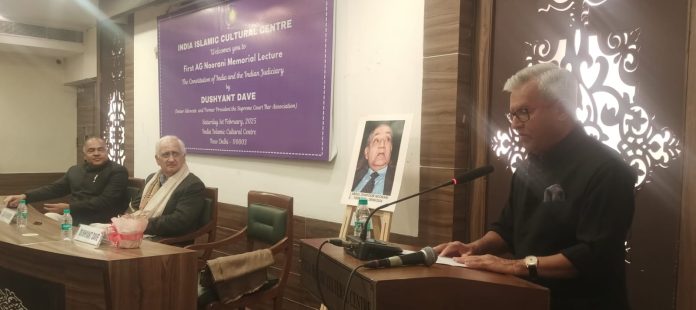In the first AG Noorani Memorial Lecture, organized by the India Islamic Cultural Center (IICC) under its dialogue series, senior Supreme Court lawyer and former President of the Supreme Court Bar Association, Dushyant Dave, emphasized that the Constitution is people-centric rather than legislative or judiciary-centric.
Speaking on “The Constitution of India and the Judiciary,” Dave praised Noorani’s efforts in defending the Constitution. He said the topic remains as crucial today and highlighted that the framers of the Constitution were highly conscious of the need for an independent judiciary.
Quoting the Constituent Assembly debates, Dave recalled Dr. B.R. Ambedkar’s words:
“British jurisprudence insists that there is no right unless the Constitution provides a remedy for it. A right is real only if there is a remedy. Without a remedy, there is no right at all. I do not want to burden the Constitution with biased declarations that sound good but lack legal remedies. It is better to have limited rights with strong remedies than many empty declarations. The remedies we provided are a fundamental part of this Constitution.”
Dave cited another debate where Justice Krishna Iyer emphasized an independent judiciary as crucial for democracy. He noted that the Supreme Court has wider powers than any other federal court in the world. He asserted that the Indian Constitution is people-centric, not focused on government, executive, or power. He stressed that the Constitution was created to recognize citizens’ rights, and its institutions—executive, legislature, and judiciary—exist to protect those rights.
Referring to the Preamble, Dave highlighted its commitment to justice, liberty, equality, and fraternity, ensuring dignity, unity, and integrity. He elaborated on the right to equality and the importance of Article 32, which provides constitutional remedies for enforcing fundamental rights. He quoted Ambedkar’s words from December 9, 1948:
“If I had to name one article as the most important, without which the Constitution would be meaningless, it would be Article 32. It is the soul of the Constitution.”
Dave explained that if a person is arrested without due process, they can file a petition in court for release. The court’s role is to ensure the arrest follows legal procedures. He lamented that for 70 years, freedom and its protection have been neglected, not just by institutions but also by citizens. He urged people to stand up for their rights, as envisioned by the constitutional framers.
He recalled that the Minority Committee, led by Sardar Vallabhbhai Patel, drafted fundamental rights before Partition. These rights, he said, remain unchanged, proving their lasting significance. Dave criticized current leaders for disregarding Patel’s stance on religious and cultural rights. He pointed out that Patel had warned against interference in these rights, calling them part of a pre-Partition agreement. He questioned those in power today, saying:
“Have you reminded those in power that SardarPatel, whose statue cost ₹3,500 crores, warned against tampering with minority rights?”
Dave concluded by saying that the Constitution’s framers foresaw today’s crisis in governance, judiciary, and society. He emphasized that the way forward is Satyagraha, as practiced by Mahatma Gandhi.




